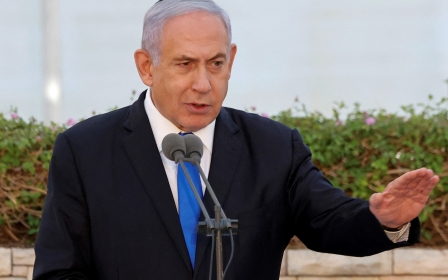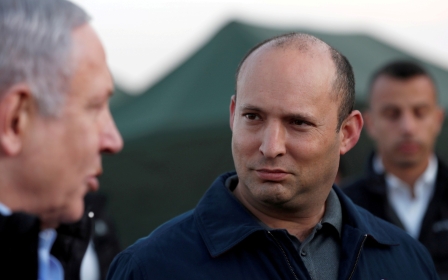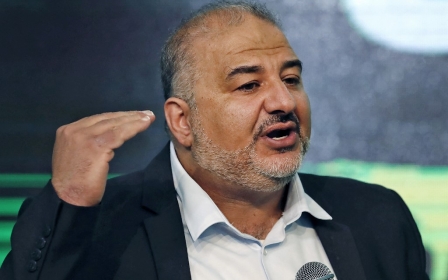Mansour Abbas: An icon for supporters of Israeli settler-colonialism

An agreement to form a new Israeli government has been achieved. But amid all the excitement over ousting Prime Minister Benjamin Netanyahu, important questions are being ignored, painting a distorted picture of reality - particularly with regards to the “Arab” component of the new coalition.
Key Israeli Zionists have finally found a Palestinian politician to praise, describing United Arab List leader Mansour Abbas as “courageous” for having taken the “historic” decision to join a government coalition. An official close to Abbas said the inclusion of the United Arab List would “break a taboo” with regards to Arab participation in Israeli politics.
His message boils down to: 'We understand you will continue discriminating against us; just please do it nicely'
None of these assertions are accurate. While we are all happy to see Netanyahu go - and hopefully he’ll go straight to court, whether inside Israel or outside, after dedicating his political life to negating the rights of the Palestinian people - this is not just about one person.
Anyone truly committed to a just and lasting peace for Israelis and Palestinians must ask one simple question: will this government change any of the major racist and criminal policies targeting Palestinians on both sides of the Green Line? The answer is no.
By joining this coalition, Abbas became an iconic figure for supporters of settler-colonialism and institutional discrimination, which has been codified in Israel through policies and legislation such as the Jewish nation-state law. Imagine for a moment: what will happen to Palestinian citizens of Israel with someone like Ayelet Shaked in charge of their files as interior minister?
New MEE newsletter: Jerusalem Dispatch
Sign up to get the latest insights and analysis on Israel-Palestine, alongside Turkey Unpacked and other MEE newsletters
If you analyse Abbas’s path towards this deal, it fully aligns with what people such as Naftali Bennett want all Palestinian citizens to do: give up on their national identity, accept Jewish supremacy and steer the discussion away from collective Palestinian rights.
On the other side of the Green Line, the “pragmatism” of Abbas also prevents him from calling for an end to the occupation that some of his partners celebrate. There are also no signs of the more “traditional” calls for the government to support a two-state solution, commit to the “peace process”, halt the ethnic cleansing of Palestinians, or protect the status quo at Jerusalem’s holy sites.
Dangerous precedent
Abbas was absent from demonstrations led by Palestinian citizens of Israel. He’s been disowned even by branches of his own party, as many believe he is setting a dangerous precedent in favour of those who aim to perpetuate the current state of affairs in the country. In other words, his message boils down to: “We understand you will continue discriminating against us; just please do it nicely.”
Perhaps a few home demolitions will be frozen, and who knows - a few of the 40 unrecognised Bedouin villages in the Naqab may be recognised after 73 years of Israeli statehood.
At the same time, the Jewish-nation state law - along with dozens of other discriminatory laws, from nationality to the “Nakba Law” - will continue to be implemented. What about reclaiming our pre-1948 property, as Jews are allowed to do? Nothing on that.
Should a fifth election have taken place, Abbas would have had a very slim chance of being elected. He knew that the Palestinian street would have punished him for his whitewashing of Netanyahu and his proximity to other anti-Palestinian extremists. There’s nothing “courageous” about his decision; it was based on his own political survival. Presenting this as a “victory” is nothing short of an insult to our people’s dignity.
In our daily political work at the Knesset, we raise important policy issues in many areas, from disability rights, to health, to education. This is part of our work, but it does not mean forgetting the mandate given to us by our voters, which entails moving towards a comprehensive peace that ensures the rights of our people. This includes making Israel a state for all its citizens and ending the occupation that began in 1967, in accordance with relevant UN resolutions.
We would be complicit in Israel’s human rights violations against our people if we did not remind the state and its leaders of their obligations under international law. That includes cancelling all laws that discriminate against Palestinian citizens based on national, religious or ethnic origin.
Palestinian self-determination
The root causes of our current situation, including our calls for international protection after state-sponsored attacks against our people, are not just about Netanyahu’s April decision to escalate tensions in order to stay in power. On a broader level, we need to delve into the basic principles upon which the state of Israel sets its policies regarding the Palestinian people.
While the UN has announced plans to launch an unprecedented investigation that will examine conditions for Palestinian citizens of Israel, it is important to be courageous enough to accept reality: Israel’s policies throughout Israel and the occupied territories aim to perpetuate Jewish supremacy, denying the Palestinian right to self-determination and rejecting any political solution beyond our surrender to apartheid. The new Israeli government will not fundamentally change this.
People like Abbas are part of the past. Palestinians in the streets, bolstered by global campaigns of solidarity, have shown that we are much stronger than many expected. As we continue organising our people while engaging with the international community - and as our voices start being heard in circles that didn’t know about the plight of Palestinian citizens of Israel - we’ll keep stressing that the basis for any pragmatic political engagement between Palestinians and Jewish Israelis should be based on the fundamental principles of equality, freedom, justice and security for all.
This is how we can achieve peace. Settling for anything less isn’t pragmatism, but a declaration of surrender that the vast majority of our people will not accept.
The views expressed in this article belong to the author and do not necessarily reflect the editorial policy of Middle East Eye.
Middle East Eye delivers independent and unrivalled coverage and analysis of the Middle East, North Africa and beyond. To learn more about republishing this content and the associated fees, please fill out this form. More about MEE can be found here.







